Unit 6 Enjoying CyclingTopic 2 How about exploring Tian’anmen Square? Sectionc 课件(16张PPT)
文档属性
| 名称 | Unit 6 Enjoying CyclingTopic 2 How about exploring Tian’anmen Square? Sectionc 课件(16张PPT) | 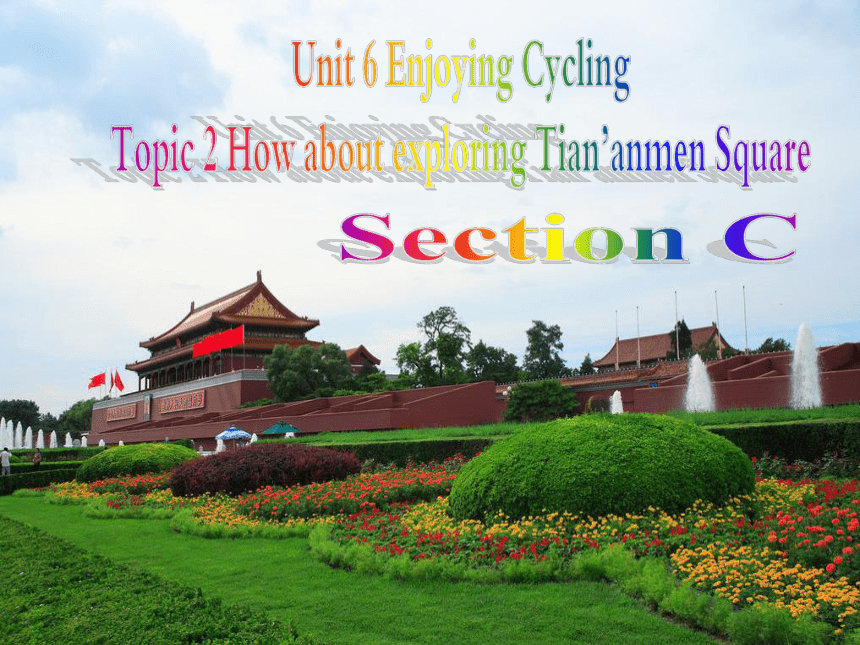 | |
| 格式 | zip | ||
| 文件大小 | 3.4MB | ||
| 资源类型 | 教案 | ||
| 版本资源 | 仁爱科普版 | ||
| 科目 | 英语 | ||
| 更新时间 | 2019-03-16 21:05:52 | ||
图片预览

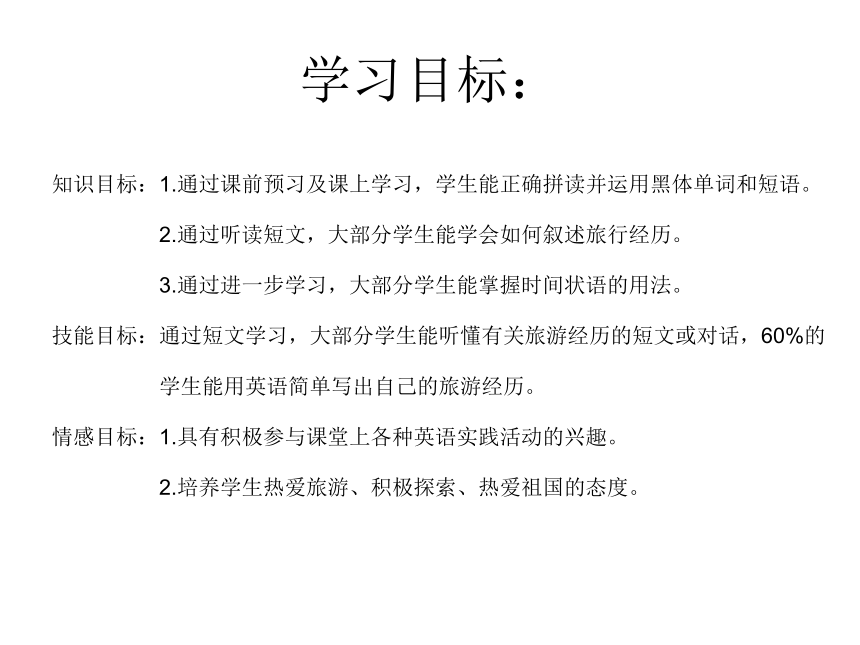


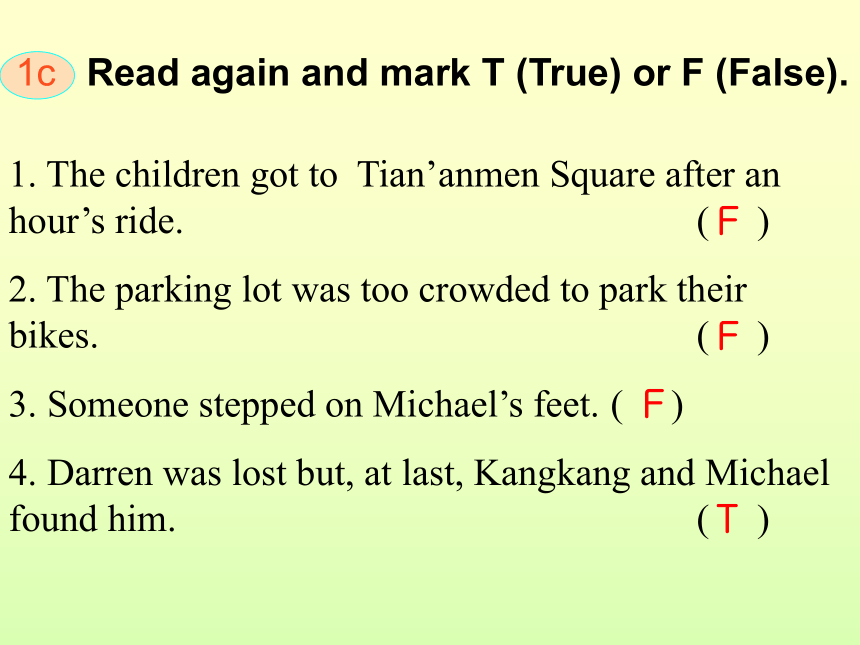
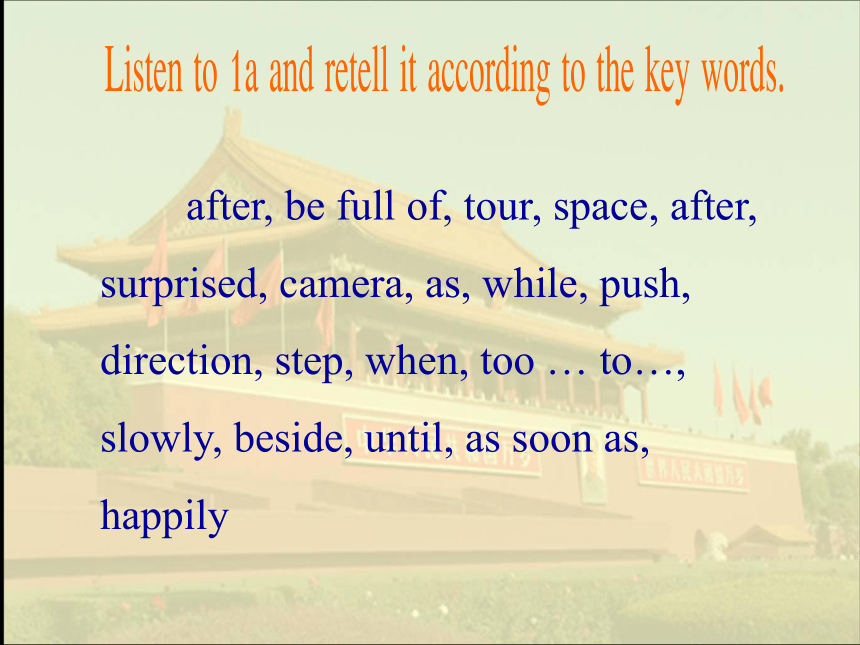
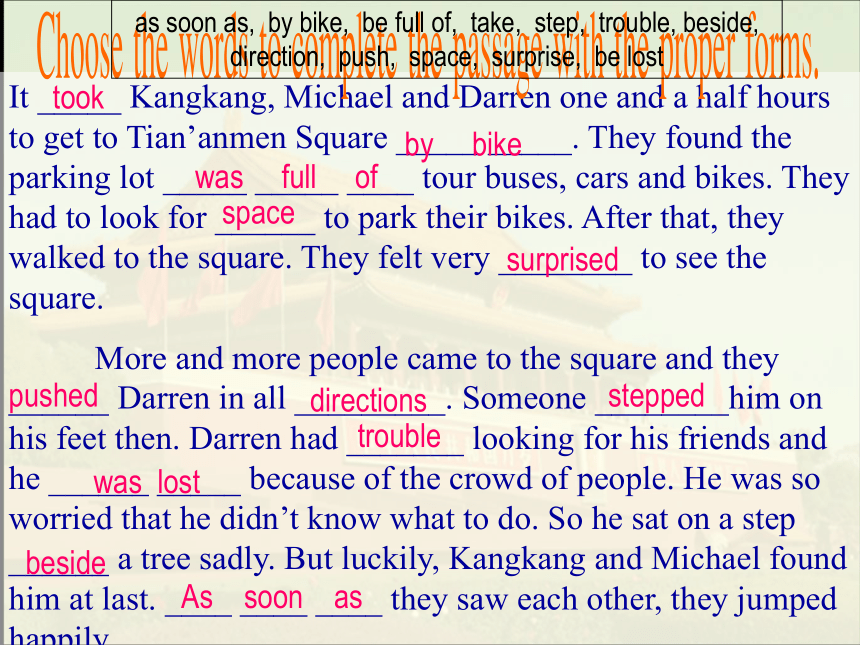
文档简介
学习目标:
知识目标:1.通过课前预习及课上学习,学生能正确拼读并运用黑体单词和短语。
2.通过听读短文,大部分学生能学会如何叙述旅行经历。
3.通过进一步学习,大部分学生能掌握时间状语的用法。
技能目标:通过短文学习,大部分学生能听懂有关旅游经历的短文或对话,60%的
学生能用英语简单写出自己的旅游经历。
情感目标:1.具有积极参与课堂上各种英语实践活动的兴趣。
2.培养学生热爱旅游、积极探索、热爱祖国的态度。
Read 1a quickly and number the pictures. Then work in groups of four and retell the story based on the pictures.
1
2
3
4
Look at the pictures, guess its right order and what the passage is about.
tour
space
push
direction
step
beside
sad adj. + ly → sadly adv.
slow adj. + ly → slowly adv.
n. 旅游,观光
u.n. 空间;空地
v.& n. 推
n. 方向,方位
v. 踩,走; n.台阶,脚步
prep.在…… 旁边
Read again and mark T (True) or F (False).
1. The children got to Tian’anmen Square after an hour’s ride. ( )
2. The parking lot was too crowded to park their bikes. ( )
3. Someone stepped on Michael’s feet. ( )
4. Darren was lost but, at last, Kangkang and Michael found him. ( )
F
F
F
T
after, be full of, tour, space, after, surprised, camera, as, while, push, direction, step, when, too … to…, slowly, beside, until, as soon as, happily
It _____ Kangkang, Michael and Darren one and a half hours to get to Tian’anmen Square _____ _____. They found the parking lot _____ _____ ____ tour buses, cars and bikes. They had to look for ______ to park their bikes. After that, they walked to the square. They felt very ________ to see the square.
More and more people came to the square and they ______ Darren in all _________. Someone ________him on his feet then. Darren had _______ looking for his friends and he ______ _____ because of the crowd of people. He was so worried that he didn’t know what to do. So he sat on a step ______ a tree sadly. But luckily, Kangkang and Michael found him at last. ____ ____ ____ they saw each other, they jumped happily.
took
by bike
was full of
space
surprised
pushed
directions
stepped
trouble
was lost
beside
As soon as
as soon as, by bike, be full of, take, step, trouble, beside, direction, push, space, surprise, be lost
Read 1a again. Find out and learn the adverbial clauses of time.
After they rode their bikes for one and a half hours, ….
After …
As …
While …
When …
not … until…
As soon as …
Kangkang, Michael and Darren rode to Tian’anmen Square together. _______ they parked their bikes, they walked to Tian’anmen Square. _______ they were enjoying exploring, the crowd of people became larger and larger. __________ the crowd was pushing Darren in all directions, someone stepped on his feet. _______ Darren finally pushed his way out, he couldn’t find his two friends. He was frightened and sat down on a step. He didn’t raise his head _______ Kangkang called his name. __________ they saw each other, they all jumped around happily.
Fill in the blanks with the conjunctions in the box based on 1a.
After
As
While/When
When
until
As soon as
Dear Darren,
How are you? I’d like to tell you about my travel experiences.
Last month, I went to Jiuzhaigou for my vacation with my parents. Jiuzhaigou is in Sichuan, in the southwest part of China. It’s famous for its beautiful mountains, forests and lakes. Many people go there to enjoy their vacation every year. My father booked the room before we arrived. We had a two-day trip and took a lot of photos. We saw pandas and monkeys. They were very cute and we couldn’t help watching them.
We had an exciting trip! I felt tired but happy. Please e-mail me soon and tell me about your vacation.
Yours, Bill
Darren received an email from his pen pal, Bill. Read it and help Darren reply to him.
九寨沟
u.n. 经验;c.n. 经历,体验
Project
Suppose you are Darren, complete the email to Bill.
Dear Bill,
I’m glad to receive your e-mail and learn that you had a wonderful vacation. I had a nice vacation, too. _______________________________________
_______________________________________
_______________________________________ Yours, Darren
When did you go?
Who did you go with?
Where did you go?
How did you do there?
What did you do there?
How was your trip?
How did you feel?
We learn
New words and expressions:
be full of, tour, space, push, direction, step, beside, experience
Adverbial clauses of time:
After parking their bikes, they walked to the Tian’anmen Square.
We can
Write about our own travel experience.
Tell stories by using adverbial clauses of time.
1. Review the key words and useful expressions in Section C.
2. Try to write more sentences with the conjunctions “before, after, when, while, as soon as, not … until”.
3. Talk about your own travel experience.
4. Preview Section D.
知识目标:1.通过课前预习及课上学习,学生能正确拼读并运用黑体单词和短语。
2.通过听读短文,大部分学生能学会如何叙述旅行经历。
3.通过进一步学习,大部分学生能掌握时间状语的用法。
技能目标:通过短文学习,大部分学生能听懂有关旅游经历的短文或对话,60%的
学生能用英语简单写出自己的旅游经历。
情感目标:1.具有积极参与课堂上各种英语实践活动的兴趣。
2.培养学生热爱旅游、积极探索、热爱祖国的态度。
Read 1a quickly and number the pictures. Then work in groups of four and retell the story based on the pictures.
1
2
3
4
Look at the pictures, guess its right order and what the passage is about.
tour
space
push
direction
step
beside
sad adj. + ly → sadly adv.
slow adj. + ly → slowly adv.
n. 旅游,观光
u.n. 空间;空地
v.& n. 推
n. 方向,方位
v. 踩,走; n.台阶,脚步
prep.在…… 旁边
Read again and mark T (True) or F (False).
1. The children got to Tian’anmen Square after an hour’s ride. ( )
2. The parking lot was too crowded to park their bikes. ( )
3. Someone stepped on Michael’s feet. ( )
4. Darren was lost but, at last, Kangkang and Michael found him. ( )
F
F
F
T
after, be full of, tour, space, after, surprised, camera, as, while, push, direction, step, when, too … to…, slowly, beside, until, as soon as, happily
It _____ Kangkang, Michael and Darren one and a half hours to get to Tian’anmen Square _____ _____. They found the parking lot _____ _____ ____ tour buses, cars and bikes. They had to look for ______ to park their bikes. After that, they walked to the square. They felt very ________ to see the square.
More and more people came to the square and they ______ Darren in all _________. Someone ________him on his feet then. Darren had _______ looking for his friends and he ______ _____ because of the crowd of people. He was so worried that he didn’t know what to do. So he sat on a step ______ a tree sadly. But luckily, Kangkang and Michael found him at last. ____ ____ ____ they saw each other, they jumped happily.
took
by bike
was full of
space
surprised
pushed
directions
stepped
trouble
was lost
beside
As soon as
as soon as, by bike, be full of, take, step, trouble, beside, direction, push, space, surprise, be lost
Read 1a again. Find out and learn the adverbial clauses of time.
After they rode their bikes for one and a half hours, ….
After …
As …
While …
When …
not … until…
As soon as …
Kangkang, Michael and Darren rode to Tian’anmen Square together. _______ they parked their bikes, they walked to Tian’anmen Square. _______ they were enjoying exploring, the crowd of people became larger and larger. __________ the crowd was pushing Darren in all directions, someone stepped on his feet. _______ Darren finally pushed his way out, he couldn’t find his two friends. He was frightened and sat down on a step. He didn’t raise his head _______ Kangkang called his name. __________ they saw each other, they all jumped around happily.
Fill in the blanks with the conjunctions in the box based on 1a.
After
As
While/When
When
until
As soon as
Dear Darren,
How are you? I’d like to tell you about my travel experiences.
Last month, I went to Jiuzhaigou for my vacation with my parents. Jiuzhaigou is in Sichuan, in the southwest part of China. It’s famous for its beautiful mountains, forests and lakes. Many people go there to enjoy their vacation every year. My father booked the room before we arrived. We had a two-day trip and took a lot of photos. We saw pandas and monkeys. They were very cute and we couldn’t help watching them.
We had an exciting trip! I felt tired but happy. Please e-mail me soon and tell me about your vacation.
Yours, Bill
Darren received an email from his pen pal, Bill. Read it and help Darren reply to him.
九寨沟
u.n. 经验;c.n. 经历,体验
Project
Suppose you are Darren, complete the email to Bill.
Dear Bill,
I’m glad to receive your e-mail and learn that you had a wonderful vacation. I had a nice vacation, too. _______________________________________
_______________________________________
_______________________________________ Yours, Darren
When did you go?
Who did you go with?
Where did you go?
How did you do there?
What did you do there?
How was your trip?
How did you feel?
We learn
New words and expressions:
be full of, tour, space, push, direction, step, beside, experience
Adverbial clauses of time:
After parking their bikes, they walked to the Tian’anmen Square.
We can
Write about our own travel experience.
Tell stories by using adverbial clauses of time.
1. Review the key words and useful expressions in Section C.
2. Try to write more sentences with the conjunctions “before, after, when, while, as soon as, not … until”.
3. Talk about your own travel experience.
4. Preview Section D.
同课章节目录
- Unit 5 Feeling excited
- Topic 1 You look excited
- Topic 2 I’m feeling better now.
- Topic 3 Many things can affect our feelings.
- Unit 6 Enjoying Cycling
- Topic 1 We're going on a three-day visit to Mount
- Topic 2 How about exploring Tian’anmen Square?
- Topic 3 Bicycle riding is good exercise.
- Unit 7 Food festival
- Topic 1 We’re preparing for a food festival.
- Topic 2 I’m not sure whether I can cook it well.
- Topic 3 I Cooked the Most Successfully
- Unit 8 Our Clothes
- Topic 1 We will have a class fashion show.
- Topic 2 We can design our own uniforms.
- Topic 3 He said the fashion show was wonderful.
